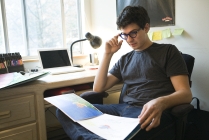COVER STORY
Undergrads seek to change the world through research
(Page 6 of 6)Publication and prestige
"Sometimes, the fruit of undergraduate research goes beyond publication in such campus student journals as Research Paper and Cornell Synapse to national, peer-reviewed journals. Alison Marklein '08 is one of many undergraduates whose work has led to authoring a published paper. "Research is attractive to me as a way to combine creativity and rationality," says Marklein, now a graduate student in ecology and biogeochemistry at the University of California-Davis.
She co-authored "Food Versus Biofuels: Environmental and Economic Costs," published in February 2009 in the journal Human Ecology. The paper is the culmination of a yearlong research-based course in which students take on a broad issue -- in this case, the viability of biofuels as an alternative energy source -- and investigate it in depth from a variety of angles.
The angles in Anthony Auletta's research, meanwhile, are of the eight-legged kind. The junior is particularly interested in the social behavior of spiders from Australia -- particularly in the way huntsman spiders share their prey.
"When I started college I was unsure whether I wanted to study entomology or … classics," Auletta says. "This research has solidified my interest in entomology. … It has made me realize that I want to do nothing else in life but study arthropods."
He's well on his way to becoming an expert. Last year, Auletta was interviewed by the Discovery Channel for two shows about dangerous scorpions on "Nature's Deadliest." He also wowed other undergrads as a teaching assistant in senior research associate Linda Rayor's spider biology class. "His lecture on scorpions was out of sight -- it was a wonderful talk," says Rayor. "The truth is he knew far more about scorpions than I did. My scorpion lectures have been based on book learning, while his lecture had a large component of personal experience."
In the College of Engineering, nearly 50 percent of undergraduates do hands-on research in faculty labs, working for a semester, a summer or longer. The college's Engineering Learning Initiatives office makes it easy for students to connect with faculty by providing structured opportunities for undergraduate research.
"Getting their feet wet in academic engineering research is really powerful for our students," says Lisa Schneider, ELI director. "It does amazing things for their lab and research skills, as well as giving them confidence and a sense of their own capabilities."
ELI works with the Intel Foundation and others to fund undergraduate engineering research projects. One of Intel's goals is to retain students in science, technology, engineering and mathematics disciplines and foster their interest in pursuing graduate degrees in these fields. "Our own self-interest is in ensuring that we have an ongoing supply of brain power to stay at the leading edge of the semiconductor and information technology industry," says Intel Foundation's Kimberly Sills. "But it's much bigger than that. It's about investing in a global future we all share."
Part of that future is in the hands of senior Sarah Elizabeth Long, whose summer work was partially funded by Intel. "I didn't expect to be involved in such big-deal research," says Long, a civil and environmental engineering major. She worked on a project run by professor Christine Shoemaker for the U.S. Department of Agriculture on using sensor networks with weather forecasts and watersheds to manage water quality.
"We are looking at sustainability issues," says Shoemaker, because storms add more phosphorous to the water supply than evenly distributed rainfall. "So we are looking at thousands of weather files to understand not only the total amount of rainfall but also the timing and magnitude of high-flow events."
"It felt good to know I could contribute to results that will ultimately help people," Long says. The experience was beneficial to her personally, too. Doing some real-world data analysis "will help me decide whether I want to go into the computational and theoretical side of engineering or do more hands-on, applied work."
In the College of Arts and Sciences, art history major Sammy Perlmutter '10 says he feels the same way, even though he is doing an entirely different kind of research. With support from the Einhorn Discovery Grant, established by Cheryl Strauss Einhorn and David Einhorn (both '91), Perlmutter completed an independent study project on some of the major themes in contemporary children's picture books.

Sammy Perlmutter '10 researched themes in children s picture books and ultimately designed and illustrated one of his own. See larger image
Although Perlmutter did valuable research exploring the relationship and interaction of postmodernism and critical literacy, perhaps his ultimate achievement was writing, illustrating and designing a children's book of his own, "This Little Snail Climbs the Mountain," which has yet to find a publisher. Important research, yes, but as Perlmutter admits, "Now I'm mainly just focused on how much fun it is."